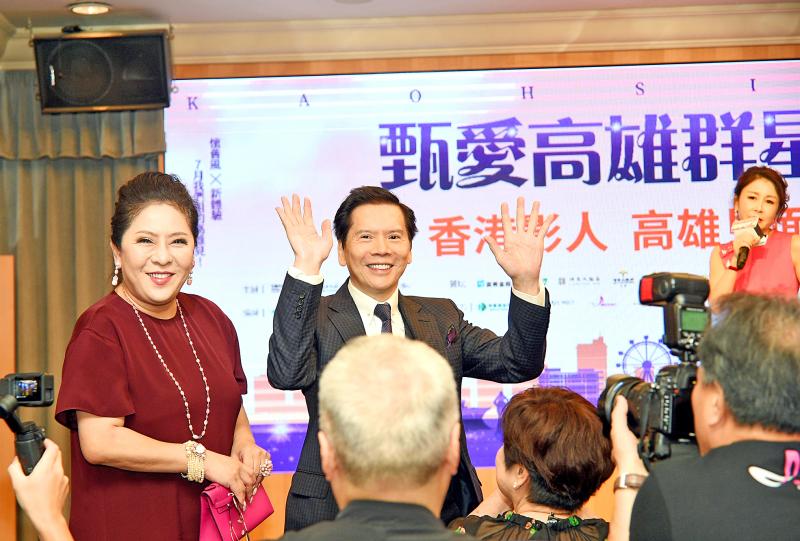Protecting national security is the priority, Premier Su Tseng-chang (蘇貞昌) said yesterday after the government rejected residency applications by Hong Kong entertainment tycoon Charles Heung (向華強) and his son.
“Government officials handling the case have applied the most rigorous scrutiny, with the top priority to protect national security,” Su said. “Ministries will report to the public the details of the decisionmaking process at a suitable time.”
Su was responding to media queries about the National Immigration Agency’s (NIA) decision on Thurdsay to deny applications by Heung and his eldest son, Jacky Heung (向佐), to obtain residency in Taiwan through Heung’s Taiwanese wife, Tiffany Chan (陳嵐).

Photo: Chang Chung-yi, Taipei Times
The NIA said that its decision was based on Article 22 of the Regulations Governing Residency or Permanent Residency for People of the Hong Kong Area and the Macau Area (香港澳門居民進入臺灣地區及居留定居許可辦法), which lists reasons to reject an application, including incomplete paperwork, the risk of an applicant “harming national interests” and involvement in entities linked to the Chinese government.
Sources said that the decision was made after meetings between officials from the NIA, the National Security Bureau and the Mainland Affairs Council.
Charles Heung is honorary deputy chairman of the China Film Foundation, sources said.
Although it is registered as a foundation, it is controlled by the Chinese State Administration of Press, Publication, Radio, Film and Television, an agency under the Chinese State Council, they said.
Bureau officials said that the foundation conducts propaganda campaigns for Beijing and organizes programs for the Chinese government’s push for “all-citizen national defense” in public education.
NIA records showed that Charles Heung has been refused entry numerous times, as files from the Martial Law-era Taiwan Garrison Command list him as a “senior figure” of Hong Kong’s largest criminal organization, the Sun Yee On.
Vetting showed that Jacky Heung is a member of the National Committee of the All-China Youth Federation, an organ with links to the Chinese Communist Youth League, sources said.
National security officials could not exclude the possibility that the family was seeking to move to Taiwan on instructions from the Chinese Communist Party to carry out specific missions, and might undermine public safety, as well as the rights of Taiwanese and Hong Kongers in Taiwan.
Additional reporting by Jason Pan and Lin Liang-sheng

DEMOGRAPHICS: Robotics is the most promising answer to looming labor woes, the long-term care system and national contingency response, an official said Taiwan is to launch a five-year plan to boost the robotics industry in a bid to address labor shortages stemming from a declining and aging population, the Executive Yuan said yesterday. The government approved the initiative, dubbed the Smart Robotics Industry Promotion Plan, via executive order, senior officials told a post-Cabinet meeting news conference in Taipei. Taiwan’s population decline would strain the economy and the nation’s ability to care for vulnerable and elderly people, said Peter Hong (洪樂文), who heads the National Science and Technology Council’s (NSTC) Department of Engineering and Technologies. Projections show that the proportion of Taiwanese 65 or older would

Nvidia Corp yesterday unveiled its new high-speed interconnect technology, NVLink Fusion, with Taiwanese application-specific IC (ASIC) designers Alchip Technologies Ltd (世芯) and MediaTek Inc (聯發科) among the first to adopt the technology to help build semi-custom artificial intelligence (AI) infrastructure for hyperscalers. Nvidia has opened its technology to outside users, as hyperscalers and cloud service providers are building their own cost-effective AI chips, or accelerators, used in AI servers by leveraging ASIC firms’ designing capabilities to reduce their dependence on Nvidia. Previously, NVLink technology was only available for Nvidia’s own AI platform. “NVLink Fusion opens Nvidia’s AI platform and rich ecosystem for

Taiwan Semiconductor Manufacturing Co (TSMC, 台積電) yesterday said it is building nine new advanced wafer manufacturing and packaging factories this year, accelerating its expansion amid strong demand for high-performance computing (HPC) and artificial intelligence (AI) applications. The chipmaker built on average five factories per year from 2021 to last year and three from 2017 to 2020, TSMC vice president of advanced technology and mask engineering T.S. Chang (張宗生) said at the company’s annual technology symposium in Hsinchu City. “We are quickening our pace even faster in 2025. We plan to build nine new factories, including eight wafer fabrication plants and one advanced

‘WORLD’S LOSS’: Taiwan’s exclusion robs the world of the benefits it could get from one of the foremost practitioners of disease prevention and public health, Minister Chiu said Taiwan should be allowed to join the World Health Assembly (WHA) as an irreplaceable contributor to global health and disease prevention efforts, Minister of Foreign Affairs Lin Chia-lung (林佳龍) said yesterday. He made the comment at a news conference in Taipei, hours before a Taiwanese delegation was to depart for Geneva, Switzerland, seeking to meet with foreign representatives for a bilateral meeting on the sidelines of the WHA, the WHO’s annual decisionmaking meeting, which would be held from Monday next week to May 27. As of yesterday, Taiwan had yet to receive an invitation. Taiwan has much to offer to the international community’s